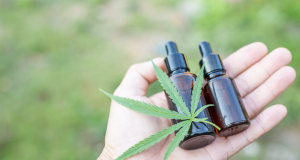The inhibition of these enzymes, explained the researchers, mean that CBD use could help tobacco users curb their urge to smoke. “The whole mission is to decrease harm from smoking, which is not from the nicotine per se, but all the carcinogens and other chemicals that are in tobacco smoke,” says Philip Lazarus. “If we can minimize that harm, it would be a great thing for human health.” Further research is needed to confirm these effects and determine dosage levels, but these findings are promising.
Another study funded mainly by the National Institutes of Health (NIH) found that cannabidiol (CBD) inhibits infection of SARS-CoV-2 in cells and mice. The substance acts after viral entry, inhibiting viral gene expression and reversing many effects of SARS-CoV-2 on host gene transcription. To this effect, the study presented CBD as a potential preventative agent for early-stage SARS-CoV-2 infection, and highlighted that future clinical trials should be conducted to ascertain this.
Ketene may be the underlying cause of EVALI
On the otherhand, a study by Portland State University’s Robert Strongin, discussed the formation of the gas ketene, when cannabinoid acetates in cannabis vapes are heated. It is now a known fact that the infamous vape-related lung injury EVALI was being caused by the inhalation of vitamin e acetate found in illicit cannabis vaping products.
Strongin, doctoral student Kaelas Munger, and Robert Jense, reported that ketene may be to blame, a toxic gas that is formed when vitamin e acetate is heated. The researchers aimed to identify precisely how much ketene was produced from a single puff of cannabis vapes. They focused on certain cannabinoid acetates such as the unregulated Delta 8 THC acetate, and found that ketene is actually found at lower temperatures than previously thought.
“The thing we’re most concerned about is prolonged exposure — we don’t know what that is,” Munger explained. “That’s why papers like ours are needed. Otherwise people would be exposed to this really toxic substance and it’s really impossible to look for the evidence,” explained Munger.
The American Chemical Society describes ketene as “a colorless, toxic gas with a ‘penetrating’ odor’. A previous study from the scientific journal “Proceedings of the National Academy of Sciences (NAS) of the United States of America” found that ketene “has been reported to cause severe, acute lung damage” when studied in animals.
Stongin and his team highlighted that the NAS study had laid the groundwork for their study by establishing that vitamin E acetate “reacts when aerosolized with an e-cigarette to produce the highly toxic gas ketene.” The researchers added that “confirmation that [vitamin E acetate]-derived ketene is a causative agent of EVALI must await rigorous clinical investigation,’ however this study does remphasize the importance of not vaping unregulated THC products.
The decriminilization of cannabis in Europe
In other news, Europe seems to consistently moving towards decriminilizing and regulating the cannabis market. In April 2023 the Czech cabinet approved a plan which included a measure introducing a strict regulatory regime for the cannabis market based on suggestions by an expert group.
Many other countries in Europe have already legalised cannabis for limited medicinal purposes, while other have decriminalized its general use. Last year Germany’s Health Minister Karl Lauterbach presented a paper on a planned legislation to regulate the controlled distribution and consumption of cannabis for recreational purposes.
While Germany’s neighbour, Switzerland, a country renowned for a long history of pioneering drug policy, has held two national referendums on cannabis legalization. As a result, sales of CBD have been allowed for some years, and cannabis for personal possession was decriminalized in 2012. In 2021, Malta- the smallest country in the EU, also became the first one within the Union to legalise the cultivation and possession of cannabis for personal use.












